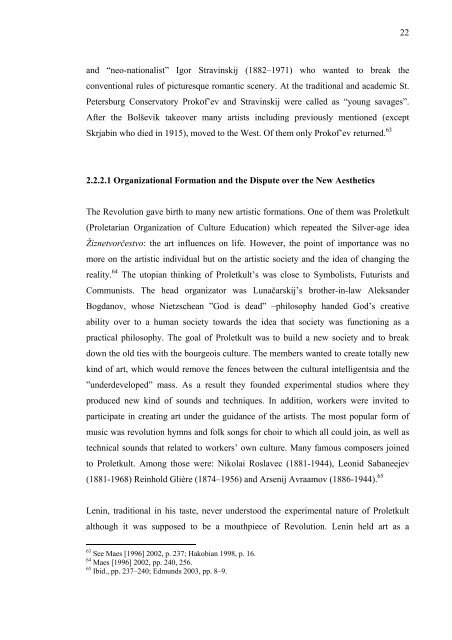Boris Asaf'ev and the Soviet Musicology - E-thesis
Boris Asaf'ev and the Soviet Musicology - E-thesis
Boris Asaf'ev and the Soviet Musicology - E-thesis
You also want an ePaper? Increase the reach of your titles
YUMPU automatically turns print PDFs into web optimized ePapers that Google loves.
<strong>and</strong> “neo-nationalist” Igor Stravinskij (1882–1971) who wanted to break <strong>the</strong><br />
conventional rules of picturesque romantic scenery. At <strong>the</strong> traditional <strong>and</strong> academic St.<br />
Petersburg Conservatory Prokof’ev <strong>and</strong> Stravinskij were called as “young savages”.<br />
After <strong>the</strong> Bolševik takeover many artists including previously mentioned (except<br />
Skrjabin who died in 1915), moved to <strong>the</strong> West. Of <strong>the</strong>m only Prokof’ev returned. 63<br />
2.2.2.1 Organizational Formation <strong>and</strong> <strong>the</strong> Dispute over <strong>the</strong> New Aes<strong>the</strong>tics<br />
The Revolution gave birth to many new artistic formations. One of <strong>the</strong>m was Proletkult<br />
(Proletarian Organization of Culture Education) which repeated <strong>the</strong> Silver-age idea<br />
Žiznetvorčestvo: <strong>the</strong> art influences on life. However, <strong>the</strong> point of importance was no<br />
more on <strong>the</strong> artistic individual but on <strong>the</strong> artistic society <strong>and</strong> <strong>the</strong> idea of changing <strong>the</strong><br />
reality. 64 The utopian thinking of Proletkult’s was close to Symbolists, Futurists <strong>and</strong><br />
Communists. The head organizator was Lunačarskij’s bro<strong>the</strong>r-in-law Aleks<strong>and</strong>er<br />
Bogdanov, whose Nietzschean ”God is dead” –philosophy h<strong>and</strong>ed God’s creative<br />
ability over to a human society towards <strong>the</strong> idea that society was functioning as a<br />
practical philosophy. The goal of Proletkult was to build a new society <strong>and</strong> to break<br />
down <strong>the</strong> old ties with <strong>the</strong> bourgeois culture. The members wanted to create totally new<br />
kind of art, which would remove <strong>the</strong> fences between <strong>the</strong> cultural intelligentsia <strong>and</strong> <strong>the</strong><br />
”underdeveloped” mass. As a result <strong>the</strong>y founded experimental studios where <strong>the</strong>y<br />
produced new kind of sounds <strong>and</strong> techniques. In addition, workers were invited to<br />
participate in creating art under <strong>the</strong> guidance of <strong>the</strong> artists. The most popular form of<br />
music was revolution hymns <strong>and</strong> folk songs for choir to which all could join, as well as<br />
technical sounds that related to workers’ own culture. Many famous composers joined<br />
to Proletkult. Among those were: Nikolai Roslavec (1881-1944), Leonid Sabaneejev<br />
(1881-1968) Reinhold Glière (1874–1956) <strong>and</strong> Arsenij Avraamov (1886-1944). 65<br />
Lenin, traditional in his taste, never understood <strong>the</strong> experimental nature of Proletkult<br />
although it was supposed to be a mouthpiece of Revolution. Lenin held art as a<br />
63 See Maes [1996] 2002, p. 237; Hakobian 1998, p. 16.<br />
64 Maes [1996] 2002, pp. 240, 256.<br />
65 Ibid., pp. 237–240; Edmunds 2003, pp. 8–9.<br />
22

















